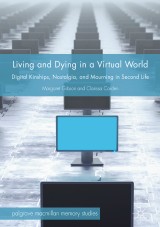Details

Living and Dying in a Virtual World
Digital Kinships, Nostalgia, and Mourning in Second LifePalgrave Macmillan Memory Studies
|
53,49 € |
|
| Verlag: | Palgrave Macmillan |
| Format: | |
| Veröffentl.: | 13.08.2018 |
| ISBN/EAN: | 9783319760995 |
| Sprache: | englisch |
Dieses eBook enthält ein Wasserzeichen.
Beschreibungen
This book takes readers into stories of love, loss, grief and mourning and reveals the emotional attachments and digital kinships of the virtual 3D social world of Second Life. At fourteen years old, Second Life can no longer be perceived as the young, cutting-edge environment it once was, and yet it endures as a place of belonging, fun, role-play and social experimentation. In this volume, the authors argue that far from facing an impending death, Second Life has undergone a transition to maturity and holds a new type of significance. As people increasingly explore and co-create a sense of self and ways of belonging through avatars and computer screens, the question of where and how people live and die becomes increasingly more important to understand. This book shows how a virtual world can change lives and create forms of memory, nostalgia and mourning for both real and avatar based lives.
1. Introduction.- 2. Blended Families.- 3. Grievable Lives.- 4. Commemorative Culture.- 5. Sentimental Objects.- 6. Nostalgia.- 7. Conclusion.
<div><div><div><div><div><b>Margaret Gibson</b> is Senior Lecturer in the School of Humanities, Languages, and Social Sciences at Griffith University, Australia. She is a leading international researcher on physical and digital mourning, memory and memorialisation.</div><div><br></div><div><div><b>Clarissa Carden</b> is a PhD Candidate in Sociology in the School of Humanities, Languages, and Social Sciences at Griffith University, Australia. Her research explores the way in which morals and traditions respond to changing circumstances.</div><div><br></div></div></div></div></div></div>
This book takes readers into stories of love, loss, grief and mourning and reveals the emotional attachments and digital kinships of the virtual 3D social world of Second Life. At fourteen years old, Second Life can no longer be perceived as the young, cutting-edge environment it once was, and yet it endures as a place of belonging, fun, role-play and social experimentation. In this volume, the authors argue that far from facing an impending death, Second Life has undergone a transition to maturity and holds a new type of significance. As people increasingly explore and co-create a sense of self and ways of belonging through avatars and computer screens, the question of where and how people live and die becomes increasingly more important to understand. This book shows how a virtual world can change lives and create forms of memory, nostalgia and mourning for both real and avatar based lives.
Recognises the social transformations of the digital revolution in identity, death and grief rituals Asks the reader to think about the multiplicity of places in which people now make a life with others through avatar based identities and bodies Introduces evocative ideas such as the association between nostalgia and the digital
<br>
<p>“This book is unique in scope and depth. It takes us into the now mature virtual social world of Second Life focusing on questions of death, mourning, memorialisation, nostalgia, and forms of digital kinship. The authors make a convincing argument for engaged living: the space is populated by people who have grown 'digital flesh' made of memories, sentimental objects and long-term relationships. In the hyped beginning, I too lived in Second Life - this book seriously makes me want to give it a second chance!” (Dr. Stine Gotved, The IT University of Copenhagen, Denmark)</p>
<p>“What do 'living' and 'dying' mean in virtual worlds such as Second Life? This book provides a thoughtful and provocative response to this question, which is, at heart, a profound philosophical issue. Gibson and Carden skilfully examine the expression and experience of intimacy, emotion, embodiment, memory, identity and social relationships in digital environments.” (Professor DeborahLupton, University of Canberra, Australia and author of <i>Digital Sociology</i> (2015) and <i>The Quantified Self </i>(2016)</p>
<p>“What do 'living' and 'dying' mean in virtual worlds such as Second Life? This book provides a thoughtful and provocative response to this question, which is, at heart, a profound philosophical issue. Gibson and Carden skilfully examine the expression and experience of intimacy, emotion, embodiment, memory, identity and social relationships in digital environments.” (Professor DeborahLupton, University of Canberra, Australia and author of <i>Digital Sociology</i> (2015) and <i>The Quantified Self </i>(2016)</p>
Diese Produkte könnten Sie auch interessieren:

Besonderheiten der Unternehmensbewertung in der Film- und Fernsehindustrie

von: Insa Niemeyer

48,00 €















